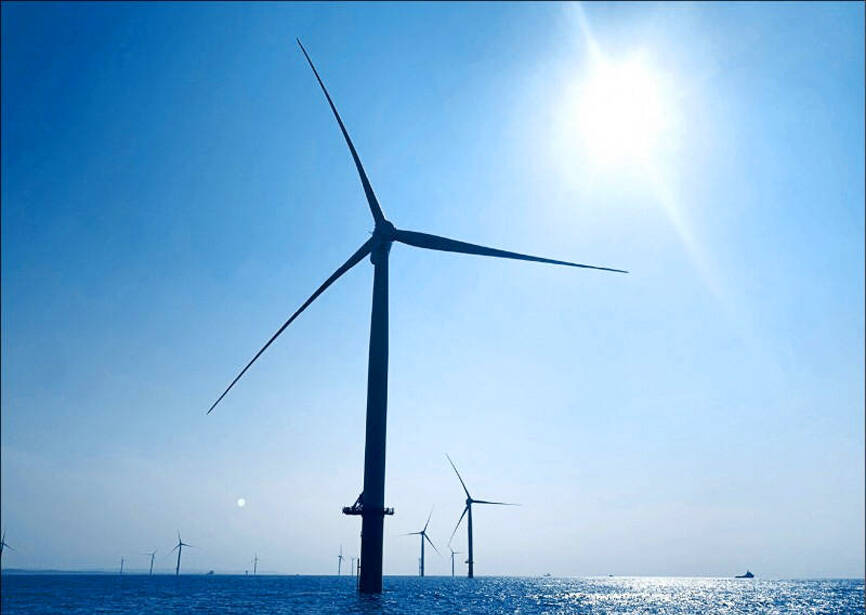Six offshore wind power developers, including Copenhagen Infrastructure Partners K/S (CIP) and Corio Generation, have won the bid to develop 3 gigawatts of wind energy for connection to the grid in 2026-2027, the Ministry of Economic Affairs said yesterday.
The four other winners are Northland Power Inc (北陸能源), Synera Renewable Energy Co (風睿能源), Taiya Renewable Energy Co (台亞風能) and Skyborn Renewable Taiwan Co (天豐新能源).
Together, the six companies are to erect wind turbines in the new development zone off Changhua County and Miaoli County. That would create 10 new wind farms, the ministry said.

Photo: Lin Jing-hua, Taipei Times
Each company would be granted up to 600 megawatts (MW) in capacity, the ministry said, adding that details about the distribution of the wind farms would be finalized by the end of this year.
Orsted A/S withdrew from the auction on the Sept. 30 deadline, citing high inflation and rising interest rates. The company is the largest shareholder of Taiwan’s first commercial-scale offshore wind project, Formosa 1, whose capacity was extended from 8MW to 128MW in 2019.
The auction is the first part of three actions under plan as the country enters the third phase of its wind power development project, the ministry said.
That means Taiwan has formally entered a stable and healthy stage of wind power development through the release of new wind power development zones each year, it said.
Next year, the ministry plans to auction another 3 gigawatts of capacity for new offshore wind farms and another 3 gigawatts are to be developed in 2024.
Taiwan began exploring wind energy in 2012 by launching pilot projects, and wind turbines were deployed from 2017.
Asked about the “slow progress” in deploying offshore wind power, the Bureau of Energy attributed it to strong ocean currents, unfavorable weather and a labor shortage this year.
Nonetheless, about 190 wind turbines have been erected this year, close to its annual target of 200, it said.
Offshore wind power is one of its 12 major strategies in developing clean energy, the bureau said, adding that solar power is another key green energy source for Taiwan to reach its goal of making renewable energy account for 15 percent of overall electricity generation by 2025.

Semiconductor business between Taiwan and the US is a “win-win” model for both sides given the high level of complementarity, the government said yesterday responding to tariff threats from US President Donald Trump. Home to the world’s largest contract chipmaker, Taiwan Semiconductor Manufacturing Co (TSMC, 台積電), Taiwan is a key link in the global technology supply chain for companies such as Apple Inc and Nvidia Corp. Trump said on Monday he plans to impose tariffs on imported chips, pharmaceuticals and steel in an effort to get the producers to make them in the US. “Taiwan and the US semiconductor and other technology industries

SMALL AND EFFICIENT: The Chinese AI app’s initial success has spurred worries in the US that its tech giants’ massive AI spending needs re-evaluation, a market strategist said Chinese artificial intelligence (AI) start-up DeepSeek’s (深度求索) eponymous AI assistant rocketed to the top of Apple Inc’s iPhone download charts, stirring doubts in Silicon Valley about the strength of the US’ technological dominance. The app’s underlying AI model is widely seen as competitive with OpenAI and Meta Platforms Inc’s latest. Its claim that it cost much less to train and develop triggered share moves across Asia’s supply chain. Chinese tech firms linked to DeepSeek, such as Iflytek Co (科大訊飛), surged yesterday, while chipmaking tool makers like Advantest Corp slumped on the potential threat to demand for Nvidia Corp’s AI accelerators. US stock

The US Federal Reserve is expected to announce a pause in rate cuts on Wednesday, as policymakers look to continue tackling inflation under close and vocal scrutiny from US President Donald Trump. The Fed cut its key lending rate by a full percentage point in the final four months of last year and indicated it would move more cautiously going forward amid an uptick in inflation away from its long-term target of 2 percent. “I think they will do nothing, and I think they should do nothing,” Federal Reserve Bank of St Louis former president Jim Bullard said. “I think the

Cryptocurrencies gave a lukewarm reception to US President Donald Trump’s first policy moves on digital assets, notching small gains after he commissioned a report on regulation and a crypto reserve. Bitcoin has been broadly steady since Trump took office on Monday and was trading at about US$105,000 yesterday as some of the euphoria around a hoped-for revolution in cryptocurrency regulation ebbed. Smaller cryptocurrency ether has likewise had a fairly steady week, although was up 5 percent in the Asia day to US$3,420. Bitcoin had been one of the most spectacular “Trump trades” in financial markets, gaining 50 percent to break above US$100,000 and